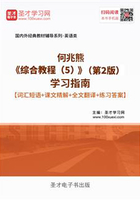
二、课文精解
Text I
1.George Orwell:乔治·奥威尔(1903-1950),英国著名小说家、记者和社会评论家。1903年生于英国殖民地的印度,童年耳闻目睹了殖民者与被殖民者之间尖锐的冲突。与绝大多数英国孩子不同,他的同情倾向悲惨的印度人民一边。少年时代,奥威尔受教育于著名的伊顿公学。后来被派到缅甸任警察,他却站在了苦役犯的一边。20世纪30年代,他参加西班牙内战,因属托洛茨基派系(第四国际)而遭排挤,回国后却又因被划入左派,不得不流亡法国。二战中,他在英国广播公司(BBC)从事反法西斯宣传工作。1950年,死于困扰其数年的肺病,年仅46岁。乔治·奥威尔一生短暂,但其以敏锐的洞察力和犀利的文笔审视和记录着他所生活的那个时代,作出了许多超越时代的预言,被称为 “一代人的冷峻良知”。主要作品包括《行刑》、《巴黎伦敦落魄记》、《在缅甸的日子》、《牧师的女儿》、《叶兰在空中飞舞》、《动物庄园》、《猎象》、《一九八四》等;代表作《动物庄园》和《一九八四》是反极权主义的经典名著,其中《一九八四》是20世纪影响最大的英语小说之一。
本文主要通过对一个囚犯遭受绞刑的描写,讲述了在外国侵略环境下,当地人和侵略者对无辜人民无情的迫害,表达了作者对这个病态而冷漠的社会的极度不满。
2.a sodden morning of the rains (Para. 1):a very wet morning during the rainy season. 一个很潮湿的雨季清晨。此处the rains指雨季,缅甸大部地区属热带季风气候,每年6-9月是当地的雨季。文章开头的环境描写烘托了当时沉闷,阴冷的气氛。
3.Each cell measured about ten feet by ten and was quite bare within except for a plank bed and a pot for drinking water. (Para. 1):each condemned cell was about ten feet long and ten feet wide, in each of which there was only a plank bed and a pot for drinking water.每间牢房大约有10英寸见方,里面只有一张木板床和一个用来饮水的罐子。quite bare暗含了牢房条件的艰苦。
4.He was a Hindu, a puny wisp of a man, with a shaven head and vague liquid eyes. (Para. 2):the short man believes Hinduism, his hair was shaven and his eyes were full of tears. 本句是对将遭受绞刑的囚犯的描述,他是个印度教徒,身材瘦小,弱不禁风,头发被剃光,眼中充满泪水,眼神空洞。
5.But he stood quite unresisting, yielding his arms limply to the ropes… (Para. 2):while standing there, he simply accepted what the warders did to him, leaving his arms at the mercy of the ropes, with which the warders lashed his arms to his sides. 然而,他(囚犯)毫无反抗地站着,双臂耷拉地让绳子捆着… unresisting为主语he的补语,意为“不反抗的”;yield sth. to sb. / sth.将某物交由某人控制;向某人/物屈服。例如:The President is now under pressure to yield power to the republics. 总统现在面临着让权给共和党人的压力。
6.“For God’s sake hurry up, Francis” (Para. 3):“天啊,快点吧,法朗西斯”,短语For God’s sake表示惊讶、愤怒、不耐烦等,常见类似表达还有:For heaven’s sake, For Christ’s sake, For goodness’s sake, For Pete’s sake等。
7.When I saw the prisoner step aside to avoid the puddle I saw the mystery, the unspeakable wrongness, of cutting a life short when it is in full tide. (Para. 8):when I watched the prisoner walk aside to evade the pool of rain on the path, I realized how awfully wrong it was to hang an active, healthy and conscious man. 当我看到那死囚为了避开水坑向旁边侧一步的时候,我发现了将一个正当壮年的生命戛然结束的神秘,那是一种无以言表的错误。step aside意为“靠边,避开”例如:They expect him to step aside and make way for an old man.他们希望他靠边站,好给一个老年人让路.
8.All the organs of his body were working—bowels digesting food, skin renewing itself, nails growing, tissues forming—all toiling away in solemn foolery. (Para. 8):all the organs of his body were playing their normal functions—his bowels were digesting what he had eaten, his skin was being replenished with new life and vigor, his nails were growing, and his tissues forming. 他身体里的所有器官都在运作——肠子在消化食品、皮肤在自我更新、指甲在生长、细胞组织在形成——全在一本正经、愚蠢地忙碌着。本句为作者看到囚犯即被行刑时内心所想,通过一系列-ing形式并列短语结构的细节描写,暗含了作者对即将死去的生命深感惋惜。
9.Everyone had changed color. (Para. 11):everyone looked pale or gray as a result of such a torturing long wait. 每个人都变了脸色。color在本句中意为脸色。
10.We all had a drink together, native and European, quite amicably. (Para. 22):after hanging, we all had a drink of whisky together, native and European alike, in a quite cheerful and friendly atmosphere. 我们大家喝起了酒,当地人和欧洲人,气氛很和睦。本句主要以反讽的手段表现了侵略者的无情,与当地人的冷漠。
Text II
1.Shooting an Elephant:《猎象记》是乔治·奥威尔的著名短篇作品,在这篇小说中,从第一人称视角,通过心理描写、比喻和对比等手段,乔治·奥威尔展示了叙述者对于缅甸人的复杂情感以及作为殖民管理者的矛盾处境。
2.I first grasped the hollowness, the futility of the white men’s dominion in the East. (Para. 2): I first understood the worthlessness and failure of the white men’s control over the countries in Asia. 我第一次看到了白人在东方的统治的空虚和无用。
3.I did not then know that in shooting an elephant one should cut an imaginary bar running from ear-hole to ear-hole. (Para. 5):At that time, I didn’t know that in shooting an elephant, one should imaging a line running through its head from one ear-hole to the other. 我当时根本不知道,要射杀一头象得瞄准双耳的耳孔之间的一条假想线,开枪把它切断。句中running from ear-hole to ear-hole为动词现在分词作后置定语结构,修饰the bar.